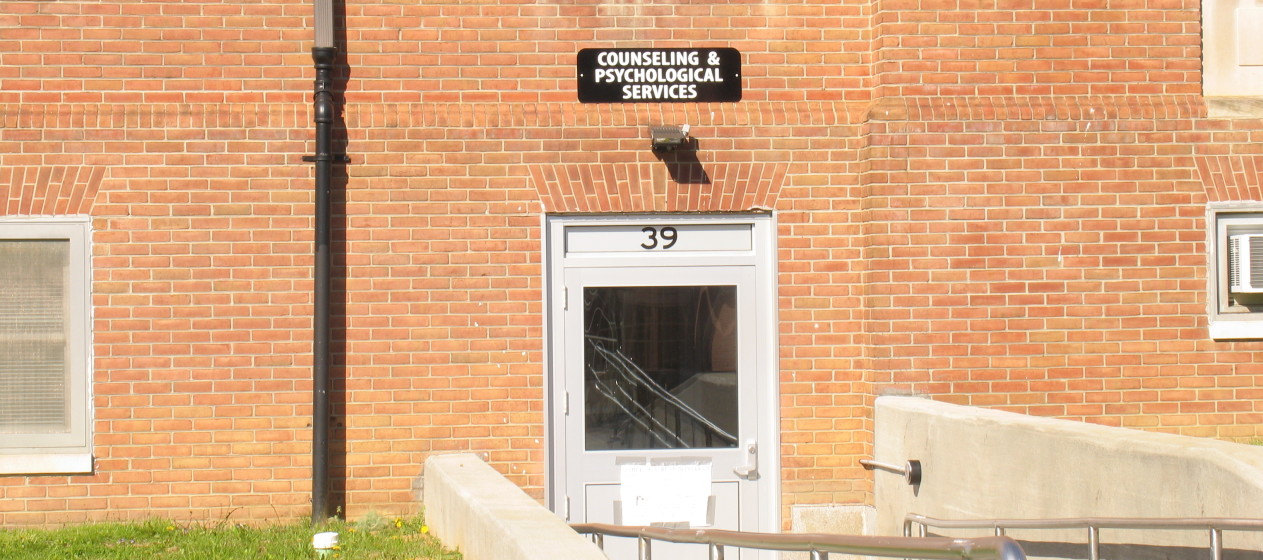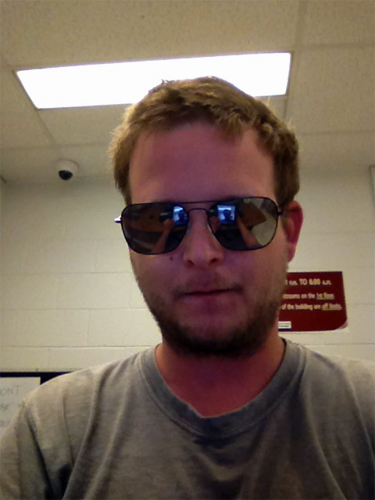Lives on the Line: Counseling Center Understaffed for Entire Academic Year
“This is a life or death problem,” Frostburg State graduate and mental health advocate (’17) Mykia Washington stated. “It directly impacts a student’s engagement, social life, academics, and their overall well-being.”
Across the country, mental health problems for college students are increasing. One study found that the average high school student in 2000 has the same level of anxiety as a psychiatric patient in the 1950’s, and those rates have only increased over the past decade.
In its pocket of Western Maryland, students at Frostburg State University are finding themselves to be part of a nationwide epidemic. Our accredited counseling center, Counseling and Psychological Services [CAPS], located in 39 Cumberland Hall, offers a variety of counseling and developmental services to students on campus at Frostburg State no charge and helps more than 400 students each year.
However, concerns have been raised about multiple CAPS issues including:
- This past academic year (2018-2019) CAPS has been understaffed. The spring semester of 2018 was the last time the Center was fully staffed.
- Three full-time counselors and one psychiatric & mental health nurse practitioner have left CAPS over the past three years. A fifth counselor was terminated according to Dr. Bowling, Vice President of Student Affairs at FSU.
- The average time a student spends on the wait list has increased over four years.
- CAPS no longer provides testing for learning disabilities like dyslexia.
- The Director’s reliance on “transpersonal mysteries of soul and spirit” raises questions whether hers are evidence-based practice to some.
“We were screaming at the administration, and they weren’t listening,” said Dr. Kevin Simonson, a former CAPS counselor and one of several to have since expressed frustration.
As of August 2016, CAPS staffing is considered a campus-safety issue just like University Police meaning the vacancies need to be filled as quickly as possible for student safety.
Mental Health on College Campuses
Over 60 percent of college students experienced “overwhelming anxiety” in the past year, according to a 2018 survey report from the American College Health Association. 68% said they “felt very sad,” and over 40% said they felt so depressed it was “difficult to function.” A 2017 Center for Disease Control and Prevention report found that suicide is the second leading cause of death in age 18-24.
According to a 2015 report by the Center for Collegiate Mental Health, the number of students who sought help from campus counseling centers increased by over 30 percent, while enrollment grew just 5 percent between fall of 2009 and spring of 2015.
Depression and anxiety are the two most common mental illnesses diagnosed in college students, said Dr. Kimberly James, a Psychology Professor at Frostburg State University. Symptoms of schizophrenia begin to manifest in early adulthood.
Increased Mental Health Needs on FSU’s Campus
Dr. Bowling said mental health has seen an increase, and Frostburg State is part of the national trend. Cynthia Smith, the University Police chief, supported this saying she has seen an increase in mental health concerns.
Faculty are also concerned about this [mental health] said Dr. Justin Dunmyre, the chair of the Faculty Concern Committee and a Math Professor at FSU. Faculty get nervous about conversations surrounding their students’ mental health asking themselves, “am I stigmatizing them [the student]?” Mental illness has always been this common, but now there is more awareness. Knowing what things to look for and how to have those conversations is something faculty would like to know, he said.
Dr. Peggy Biser, a Chemistry Professor at FSU, said she has definitely seen an increase in mental health needs of students. While students may not be coming to her with their issues, due to the environment she works in [classroom and lab setting], she has seen an increase in students who are struggling.
Mental health is a major problem students are facing, said Keith Davidson, an academic counselor in the Center for Academic Advising and Retention [CAAR]. “There is not enough general training to create a culture that’s accepting of diverse issues.” The CAAR office acts as a referral body to CAPS. The office can help “mitigate” certain issues like test anxiety. He added his office utilizes the Beacon alert system which is a “reactive way of looking at concerns.”
“75% of the Disability Support Services caseload is registered for conditions under mental health umbrella,” commented Holly Veith, the Director of Disability Support Services [DSS]. This statistic has increased over the years. In order for students to receive accommodations, their disability needs to be documented. Veith expressed that CAPS is “shrinking in staffing while increasing in need.”
There is no mandatory mental health first aid training for faculty, staff, or students at FSU. The Department of Nursing hosted a voluntary Mental Health First Aid, USA training in Feb. of 2019 which taught those in attendance how to help someone who could be experiencing a mental health or substance abuse challenge. The training was on a first-come first-serve basis and was free to the campus community.
This is the “training I’ve needed for a long time,” said Nicole Mattis, an Associate Professor in the Department of Theatre and Dance. “I would like it to be mandatory.” She said she regularly makes referrals to CAPS and has seen an increase in students with the need [of counseling].
CAPS Staffing (2018-19 Academic Year)
This past academic year [fall 2018- spring 2019] CAPS has operated while being understaffed. The current full-time staff includes the Director and Interim Training Director, Dr. Patricia Robison, John DeHart, a former intern and now hired counselor working to earn his PhD, Andrea Emerick, a Masters level counselor, Ajab Amin, a doctoral intern, Nathan Bridenolph, a part-time Masters level intern, Dr. Jean Helz, a part-time psychiatrist, and Gloria Eisel, the administrative assistant. Dr. Karen Golden and Patrick Deasy are part-time counselors at the Center.
Vacancies in staffing include the training director, a PhD level psychologist, and a doctoral intern.
Dr. Kelly Bailey no longer works at CAPS [left Jan. 2019] despite still remaining on the CAPS website.
The 2019 End of Session report from the University System of Maryland [USM] recognizes the increase in demand for mental health services and the strain on resources as institutions try to meet those demands. The report also mentions that “these issues also affect the ability of students to stay in college and graduate.” In response to this increase, the budget committees are requesting the USM, Morgan State University, and St. Mary’s College of Maryland to submit a joint report on “how they are meeting the demand, including how students request and receive services,” types of services, challenges the campus faces in meeting such demands, and if practices at other universities and telemedicine should be considered.
Turnover in CAPS Staffing
Over the past 3 years [fall of 2016 to spring of 2019], five CAPS staff members left the Center. Dr. Shawn Golden-Llewellyn served as Director until her resignation on November 7, 2016. Dr. Kelly Rock resigned from her position at CAPS effective May 16, 2017. Dr. Kevin Simonson resigned in August of 2017. Dr. Kelly Bailey left CAPS in January of 2019. The fifth was terminated from the position, added Dr. Bowling.
They “left for a variety of reasons,” mentioned Dr. Bowling. Reasons cited included termination, retiring, decreased quality of life due to demands from the position, and reducing a day-to-day commute.
“Individuals leave for a variety of reasons,” Dr. Robison noted. “It would be inappropriate for me to speculate upon or share information regarding such confidential personnel matter about any of my former colleagues who left CAPS.”
All four staff that left on their own recognizance still remain in the field of psychology. Dr. Golden-Llewllyn and Dr. Simonson now work at the Thomas B. Finan Center, an inpatient psychiatric hospital, in Cumberland, Maryland. Dr. Simonson also works at Psychological Testing Services on the side. Dr. Rock is an Assistant Professor in the Department of Nursing at FSU with a specialty in psychiatric medication management in the community mental health setting. Dr. Bailey now works at Mountain Laurel Medical Center.
According to data from the Baltimore Sun Public Salary Records, the four staff mentioned above did not experience a decrease in salary during their employment periods at CAPS. Rather, their salaries remained the same during their duration or had experienced a slight increase.
Dr. Golden-Llewllyn said salary did not contribute to her leaving CAPS. She “didn’t feel valued” and could “no longer justify the tolls the long hours were taking on her family.” During her time as Director, a vacancy was left in the psychologist position she exited [when she took the Director position] which required her to continue to provide therapy “roughly 25 hours per week.” She then completed the administrative tasks either in the evenings or on the weekends, later citing a need for a “work-life balance.”
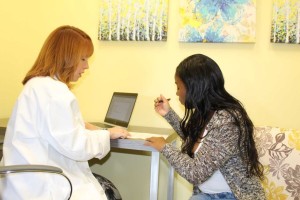
Dr. Rock expressed “conflicting philosophies of mental health care” as her reason for resigning.
Following the resignations of Dr. Rock and Dr. Golden-Llewllyn, Dr. Simonson said he felt like there was nothing he could do “to save CAPS” and was left feeling unsupported.
More on Dr. Golden- Llewllyn’s resignation can be found here: https://thebottomlinenews.com/resignation-of-caps-director-awakens-student-concern-of-fsu-administrations-seriousness/
Dr. Bailey was unable to be reached for a comment. According to her LinkedIn profile, Dr. Bailey resides in Morgantown, West Virginia which is an hour and seven-minute drive to Frostburg State University. Her new place of employment [Mountain Laurel Medical Center] in Oakland, Maryland is an hour and eight-minute drive. This was calculated using Google Maps. Her commute did not decrease.
Impact of Understaffing & Turnover
Due to the lack of staff at the center, there have been raised concerns over the wait period, the frequency of appointments, and the turnover of staff.
“The wait list should not be a deterrent,” said Dr. Bowling. It is a “modest time.”
According to data from Dr. Robison, the fall wait is always “intense,” and the spring wait list is lower:
- 2015-16: average 9 days on wait list, 85 students over duration of academic year
- 2016-17: average 8.5 – 9 days on wait list, 106 students over duration of academic year
- 2017-18: average 14 days on wait list, 180 students over duration of academic year
- 2018-19: average 13 days on wait list, 58 students over duration of semester
Dr. Robison said the Center “wait lists students who have a chance of being seen.” CAPS classifies students as either low risk, medium risk, or high-risk. Low risk students are dealing with issues that are “not quite that serious.” Medium risk students have a history of mental illness. High-risk students are actively suicidal and not functioning on a day-to-day basis. These classifications can shift over time, said Dr. Robison. She affirmed that all medium and high-risk students are being seen.
“We may not be able to offer individual therapy some may prefer but can certainly offer group therapy or outreach activities [crisis intervention],” said Dr. Robison. Group therapy is effective, and sometimes more effective as it’s “tailored to issues students are facing.” Dr. Bowling wants to remind students that “they won’t be forced into a group.” The Center is available 24 hours as there is always an on-duty crisis counselor.
Dr. Bowling stated [in Spring of 2018] there was one counselor per 589.5 students and continued to say this is the “lowest ratio of counselors to students within the USM.” This falls within IACS’s standard of “a minimum of one FTE professional staff (excluding trainees) for every 1,000 – 1,500 students.”
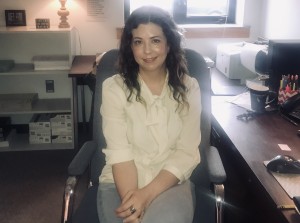
CAPS also no longer offers psychoeducational testing as it once did. Veith mentioned the last time testing was offered was the spring of 2018. Learning disabilities such as dyslexia (reading disorder), dyscalculia (math disorder), and dysgraphia (written expression disorder) require psychoeducational testing by a psychologist. These disabilities are the primary concerns for DSS and CAPS testing said Veith. Because disabilities need to be documented, this hinders certain students from receiving the accommodations they may need. In many cases, insurance does not cover learning disability testing costing students thousands of dollars out-of-pocket. This impacts about five to ten students per semester.
Some students are also referred to outside sources which presents other difficulties. Dr. Rock pointed out that referrals then require transportation and insurance which can become difficult for students. Washington suggested possibly repurposing the SafeRide and AmeriCorps vans to transport students to outside resources.
“This is not a problem we can hire out of,” believes Washington. “The whole system needs restructured.”

Student Experiences
One student, a first-year, mentioned it took two weeks to schedule the initial appointment, and after being seen, was told another could be scheduled in four weeks, or they could be referred to an outside psychologist. The student decided not to pursue therapy at CAPS or at a community resource due to the amount of time it took to get an appointment.
A junior on FSU’s campus shared their experience with CAPS. The student had a difficult time scheduling an appointment in their first year [2016-17] and then had a staff member get involved to schedule an appointment during their second year [2017-18]. Over their three years on FSU’s campus, the student has seen three counselors saying the first did not work out [was an intern and was being overseen], and the second left over the summer and “was slightly working.” “I know they scrambled to pair me with a therapist since mine left.” The student has since been switched from weekly to biweekly and said they “feel stuck.” The student also mentioned, “they [the counselor] is late getting me, and I barely get the 50 minutes sometimes.” Because of this experience, the student plans to “look for a different therapist up here … I need something better.”
Another student, a senior, said scheduling their first appointment took about a month.
Dr. Dunmyre also shared that he had a student who had to wait about a month to schedule an intake appointment.
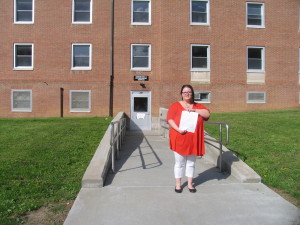
Tiffany Arnett, a 2017 graduate, says after Dr. Golden-Llewllyn’s departure in 2016, she hand-delivered letters of concern to multiple FSU administration. In her letter, Arnett detailed that many students were referred to off-campus services due the lack of staffing in the Center, and “the department was stretched to its limits.” She also wrote she found out from Dr. Golden-Llwellyn that “she is leaving the university for another job because of the frustrations she has dealt with in trying to help the students on campus with mental health concerns.”
Today, Arnett uses her personal experience with mental illness as an advocate for others. “It is sad to see that because one position could not be filled so many students were being affected,” Arnett says.
Only two administrators responded to her letters – April Baer, then Deputy Title IX Coordinator, and Dr. Ahmad Tootoonchi, then Interim Provost. Both have since left the institution. In her response, Baer called Shawn “an incredible human being” and said she had referred students to her care with the “utmost of confidence.” She also said she was “unable to affect the change necessary to ensure students have access to counseling services” and encouraged Arnett to speak to the Student Government Association.
Dr. Tootoonchi thanked Arnett for sharing her concerns called Dr. Golden-Llewllyn “one of my most wonderful, caring, and knowledgeable colleagues at FSU.” He added, “not having her as Director of CAPS worries me about the mental and psychological well-being of our students who have been benefiting from her expertise.” Dr. Tootoonchi, like Baer, said that CAPS was not in his division
Arnett says this experience left her feeling like “students’ voices don’t matter” as she spoke out and felt dismissed.
Arnett explained that CAPS was instrumental in her time as a student, and she believes it was for others as well. “Many students cannot afford the therapy off-campus or cannot find a way to get there.”
However, not all students faced those problems.
Ryan Zovko, a senior, said he had never had a problem scheduling an appointment and is able to be seen on a weekly basis by the same counselor.
A 2017 graduate who sought counseling in the 2015-16 academic year, noted that the first counselor they saw was not a match, so she asked for someone else and was changed. They credit their counselor [Dr. Simonson] for going “above and beyond” and “noticing more than just what they told him about.” They stated counseling helped with their academics.
Questions of Evidence-Based Practice
Additional concerns have been raised over Dr. Robison’s own self-description on the CAPS website which invokes her experience of “non-ordinary states of consciousness, including spiritual awakenings and existential crises,” “desert Vision Quest”, and graduation from the Barbara Brennan School of Healing Science in 2000.
The website of Barbara Brennan School of Healing Science says it “is dedicated to the evolution of the human spirit.” The academic program is “dedicated to the exploration and enrichment of Brennan Healing Science, a specialized holistic healing modality.”
Harriet Hall is a retired family physician who writes on pseudoscience and questionable medical practice. She worked as an Air Force physician holding positions ranging from flight surgeon to Director of Base Medical Services, and she contributes to Science Based Medicine. Hall said, “the Barbara Brennan school’s teachings are based on a mythical human energy field; there is no evidence that any such field exists. There is nothing scientific about Robison’s practices.”
Dr. Alan Bensley, a Psychology Professor at Frostburg State University with a specialty in critical thinking and author of Critical Thinking in Psychology and Everyday Life, said, “this approach is pseudoscience, influenced by traditional Eastern healing and religious practices. There is no good evidence for the human energy field despite their claims that their approach is scientific-so it is not evidence-based and lacks scientific plausibility.”
Other On-Campus Resources
Student Organizations
The National Alliance on Mental Illness [NAMI] is new to FSU’s campus as the student organization is in it’s second year on campus. On campus, NAMI is tasked with raising awareness, advocating, and educating the campus community. Candace Scott, a senior and President of the organization, highlighted the purpose of the organization as “celebrating that people are here.” Dr. Jennifer Earles, a Sociology Professor and NAMI’s advisor, spoke about the importance of face to face therapy as it creates human contact which is “key.” She also emphasized the increased pressures college students are facing. Dr. Bailey was NAMI’s first advisor prior to her leaving the institution.
Active Minds is another student organization centered about mental health in its second year on campus. President Jetun-Nadine Reeves explained the organization does not offer counseling but does hold forums and events that help educate the campus community about mental health. She pointed out that “you never know someone’s breaking point,” and there “needs to be a push to make it [mental health] more important.”
BURG Peer Education Network is comprised of FSU students that promote “healthy choices and the multiple dimensions of wellness” by focusing on “edu-tain-ment.” They offer programs to anyone [students, faculty, staff] that will come. The student organization is a “nationally Certified Peer Education group.” Don Swogger, BURG’s advisor, mentioned the current “anxiety epidemic” facing college students. “In light of the reality of it all, a peer education network is priceless,” said Swogger.
S.A.F.E Office
The S.A.F.E office focuses on prevention of alcohol, tobacco, and other substances. Swogger, who is also the office director, says they take a “non-judgmental approach to help students through college issues.” They provide resources to students, faculty, staff, and the Western Maryland region. The office acts as an extension to CAPS.
Both the S.A.F.E office and BURG Peer Education Network are in Pullen 109, despite the FSU website saying they are located in Sand Spring Hall.
Helping Students in Distress Handbook
Each department is given on print copy of the Helping Students in Distress and there is also a digital edition that can be found on the Frostburg website under the Division of Student Affairs. The handbook offers faculty and staff advice for helping students in need.
Pacifica
The premium version of the Pacifica app is available free to all students at Frostburg State with their frostburg.edu email address – the premium version of the app is typically $55/month. The app incorporates both Cognitive Behavioral Therapy and Mindfulness “to offer tools for stress, anxiety and depression.” Students, faculty and staff received an email announcing the resource in October of 2018 from Dr. Tom Bowling and Student Affairs.
Dr. Bowling along with Kacie Grubb and Robert Binger, Masters students in the Counseling Psychology program at FSU, brought Pacifica to the campus community. FSU President Ronald Nowaczyk made the final decision to pursue the app. Grubb explained the app as having a “social media feel to it but centered around your health.”
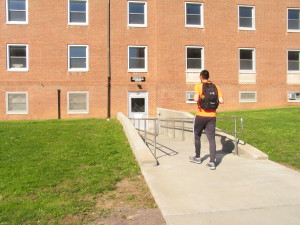
The app was met with mixed reactions from the campus community. Scott viewed the app as an attempt to “put a band-aid on a huge issue.” Dr. James mentioned the app can be good, but it does not replace therapy. Dr. Robison says the app can be viewed as “homework from the counselor” and is not supposed to replace anything [therapy] but is used to monitor and continue progress.
There has been a total of 377 total signs-ups with an average of 17 per week, and a total of 7,252 sessions with an average of 340 weekly sessions according to the March 2019 Pacifica Usage Report. The totals include students, faculty, and staff.
Moving Forward
Swogger believes that his students can helps CAPS. When students come to the peer educators, they know when to refer to CAPS [if an issue is above when they are trained to handle], but he hopes the CAPS can refer the ‘low risk’ students to the peer educators.
Dr. Rock hopes to see “the integration and expansion of both physical and mental health services in the future on campus in order to better meet the diverse needs of our student population.” She further clarified explaining that by integration, she means both physical and mental health care services being provided in the same location. In addition, she “would like to see expansion of the Mental Health First Aid, USA on campus.”
Both Dr. Bowling and Dr. Robison confirmed that the center has been matched with two interns [from a pool of 15] for the upcoming school year. The other vacant positions have been posted and strong applications have been received thus far. Both are optimistic that they may be able to return to a fully-staffed counseling center for the next academic year.
“Quietly and behind the scenes, CAPS truly saved lives,” said Dr. Golden-Llewllyn, emphasizing how valuable CAPS services are to the students.
Students can schedule an appointment at CAPS by calling 301-687-4234 or emailing CAPS@frostburg.edu.
The National Suicide Prevention Hotline is 1-800-273-8255. The lifeline is available 24-hours a day and is both free and confidential. Individuals can also text HOME to the Crisis Text Line (741741) to message with a Crisis Counselor.

